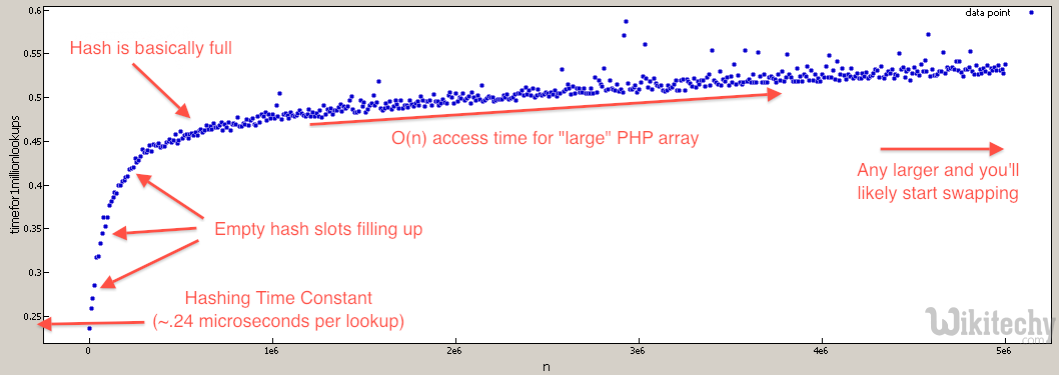- After using PHP for a while, we noticed that not all PHP built in functions as fast as expected.
- Consider the below two possible implementations of a function that finds if a number is prime using a cached array of primes.
- This is because in_array is implemented with a linear search O(n) which will linearly slow down as $prime_array grows. Where the array_key_exists function is implemented with a hash lookup O(1) which will not slow down unless the hash table gets extremely populated (in which case it’s only O(n)).
- So far we had to discover the big-O’s via trial and error, and occasionally looking at the source code. Now for the question…
Is there was a list of the theoretical (or practical) big O times for all* the PHP built in functions?
*or at least the interesting ones
For example find it very hard to predict what the big O of functions listed because the possible implementation depends on unknown core data structures of PHP: array_merge, array_merge_recursive, array_reverse, array_intersect, array_combine, str_replace (with array inputs), etc.
- We gone though and either via benchmark or code-skimming to characterize the array_* functions.
Note:
- All the Big-O where calculated assuming a hash lookup is O(1) even though it’s really O(n).
- The coefficient of the n is so low, the ram overhead of storing a large enough array would hurt you before the characteristics of lookup Big-O would start taking effect.
- For example the difference between a call to array_key_exists at N=1 and N=1,000,000 is ~50% time increase.
Interesting Points:
- isset/array_key_exists is much faster than in_array and array_search
- +(union) is a bit faster than array_merge (and looks nicer). But it does work differently so keep that in mind.
- shuffle is on the same Big-O tier as array_rand
- array_pop/array_push is faster than array_shift/array_unshift due to re-index penalty
Lookups:
- array_key_exists O(n) but really close to O(1) – this is because of linear polling in collisions, but because the chance of collisions is very small, the coefficient is also very small. I find you treat hash lookups as O(1) to give a more realistic big-O. For example the different between N=1000 and N=100000 is only about 50% slow down.
- isset( $array[$index] ) O(n) but really close to O(1) – it uses the same lookup as array_key_exists. Since it’s language construct, will cache the lookup if the key is hardcoded, resulting in speed up in cases where the same key is used repeatedly.
- in_array O(n) – this is because it does a linear search though the array until it finds the value.
- array_search O(n) – it uses the same core function as in_array but returns value.
Queue functions:
- array_push O(∑ var_i, for all i)
- array_pop O(1)
- array_shift O(n) – it has to reindex all the keys
- array_unshift O(n + ∑ var_i, for all i) – it has to reindex all the keys
Array Intersection, Union, Subtraction:
- array_intersect_key if intersection 100% do O(Max(param_i_size)*∑param_i_count, for all i), if intersection 0% intersect O(∑param_i_size, for all i)
- array_intersect if intersection 100% do O(n^2*∑param_i_count, for all i), if intersection 0% intersect O(n^2)
- array_intersect_assoc if intersection 100% do O(Max(param_i_size)*∑param_i_count, for all i), if intersection 0% intersect O(∑param_i_size, for all i)
- array_diff O(π param_i_size, for all i) – That’s product of all the param_sizes
- array_diff_key O(∑ param_i_size, for i != 1) – this is because we don’t need to iterate over the first array.
- array_merge O( ∑ array_i, i != 1 ) – doesn’t need to iterate over the first array
- + (union) O(n), where n is size of the 2nd array (ie array_first + array_second) – less overhead than array_merge since it doesn’t have to renumber
- array_replace O( ∑ array_i, for all i )
Random:
- shuffle O(n)
- array_rand O(n) – Requires a linear poll.
Obvious Big-O:
- array_fill O(n)
- array_fill_keys O(n)
- range O(n)
- array_splice O(offset + length)
- array_slice O(offset + length) or O(n) if length = NULL
- array_keys O(n)
- array_values O(n)
- array_reverse O(n)
EDIT:
- For those who doubt that PHP array lookups are O(N), we written a benchmark to test that (they are still effectively O(1) for most realistic values).
